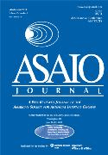
ASAIO JOURNAL
Scope & Guideline
Innovative Insights for the Future of Medicine
Introduction
Aims and Scopes
- Mechanical Circulatory Support:
Research on ventricular assist devices (VADs), including design, optimization, and patient outcomes associated with their use in heart failure and transplantation. - Extracorporeal Membrane Oxygenation (ECMO):
Studies examining the use of ECMO in various clinical scenarios, including respiratory failure and cardiac support, with a focus on improving patient management and outcomes. - Clinical Outcomes and Protocol Development:
Research aimed at understanding the clinical implications of mechanical support technologies, including protocols for anticoagulation, infection management, and patient monitoring. - Innovative Device Technologies:
Development and testing of new devices and systems for cardiac and respiratory support, including novel pumping mechanisms and monitoring systems. - Pediatric and Adult Applications:
Exploration of mechanical support technologies in both pediatric and adult populations, addressing unique challenges and outcomes in each demographic.
Trending and Emerging
- Telemonitoring and Remote Patient Management:
The rise of telehealth solutions and remote monitoring technologies for patients on mechanical support is becoming a focal point, driven by the need for continuous patient management, especially during the COVID-19 pandemic. - Artificial Intelligence and Machine Learning Integration:
Emerging research integrating AI and machine learning into patient monitoring and device management is trending, showcasing the potential for predictive analytics to improve outcomes. - Personalized and Patient-Specific Approaches:
There is an increasing interest in personalized medicine approaches within mechanical support, focusing on tailoring interventions based on individual patient characteristics and responses. - Innovations in Device Design:
The development of novel device technologies, such as miniaturized pumps and bioengineered solutions, is gaining traction, reflecting a shift towards more effective and less invasive mechanical support options. - Focus on Long-Term Outcomes and Quality of Life:
There is a growing emphasis on studying long-term outcomes and quality of life for patients receiving mechanical support, moving beyond immediate survival rates to assess the overall impact on patients' lives.
Declining or Waning
- Traditional Anticoagulation Methods:
Research on conventional anticoagulation strategies for ECMO and VADs seems to be decreasing as newer, more effective anticoagulation alternatives are being explored. - Basic Hemodynamics:
Studies focused solely on basic hemodynamic monitoring and assessment are less prevalent, with a shift towards integrating advanced monitoring techniques and machine learning models. - Single-Center Studies:
There is a noticeable decline in single-center studies as multi-center collaborations and registry analyses gain traction, providing broader insights into patient outcomes. - General Device Maintenance Protocols:
Research on routine maintenance protocols for existing devices is diminishing in favor of studies emphasizing innovative device designs and technology advancements. - Longitudinal Studies in Non-Critical Settings:
Long-term studies focusing on mechanical support outside of critical care settings are becoming less common, with more emphasis on acute, immediate interventions.
Similar Journals

Intelligent Medicine
Unlocking the potential of technology in medicine.Intelligent Medicine, published by Elsevier, is a leading open-access journal dedicated to advancing the fields of Artificial Intelligence, Biomedical Engineering, Health Informatics, and related areas within Medicine. Since its inception in 2021, it has quickly established itself among the top tier of academic publications, holding a commendable Q2 ranking in several categories, including a rank of #51 in Health Informatics and #104 in Medicine (Miscellaneous) as of 2023. The journal aims to disseminate innovative research that harnesses AI technologies to improve healthcare outcomes, bridging the gap between cutting-edge technology and medical practice. With its open-access model, Intelligent Medicine ensures broad dissemination of research findings, facilitating collaboration and knowledge sharing among researchers, practitioners, and students globally. Located in Amsterdam, Netherlands, this journal plays a pivotal role in shaping the future of intelligent healthcare solutions, inviting submissions that push the boundaries of conventional medicine through creative and impactful research.

Critical Care and Resuscitation
Exploring breakthroughs in critical care for improved patient lives.Critical Care and Resuscitation is a premier peer-reviewed journal published by Elsevier, focusing on the dynamic fields of Anesthesiology, Critical Care, and Emergency Medicine. Established in Australia, this journal has been a significant contributor to scholarly research since its inception in 1999, maintaining a strong reputation with a commendable impact factor, evidenced by its Q1 quartile rankings across its relevant categories for 2023. The journal's commitment to disseminating high-quality research is reflected in its elite standings: it ranks #7 out of 109 in Emergency Medicine, #12 out of 136 in Anesthesiology, and #16 out of 110 in Critical Care. Aimed at researchers, clinicians, and healthcare professionals, Critical Care and Resuscitation provides a vital platform for the latest advancements in patient care and clinical strategies, making it an essential resource for those eager to stay at the forefront of these critical disciplines. Although lacking Open Access options, its rigorous peer-review process ensures the publication of valuable insights that shape current practices and influence future developments in healthcare.
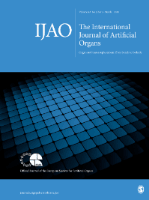
INTERNATIONAL JOURNAL OF ARTIFICIAL ORGANS
Leading the Charge in Artificial Organ Solutions.International Journal of Artificial Organs is a prestigious peer-reviewed journal published by SAGE Publications Ltd, dedicated to advancing the field of bioengineering, biomaterials, and biomedical engineering. Established in 1978, the journal has a rich history of contributing to the research community with cutting-edge studies and advancements in artificial organ technology and related disciplines. With an impact factor that positions it in the Q3 category across multiple fields, including Medicine and Engineering, the journal serves as a vital resource for researchers, professionals, and students interested in innovative solutions for organ replacement and support. While it is not an open-access journal, it offers subscription-based access, ensuring the dissemination of high-quality research to stakeholders globally. Located in Italy, the journal’s scope encompasses a variety of disciplines, making it essential reading for those at the forefront of medical technology development. Explore the latest breakthroughs and join a community committed to transforming lives through science and engineering.

ARTIFICIAL ORGANS
Connecting Ideas and Innovations in Bioengineering.ARTIFICIAL ORGANS is a leading academic journal published by Wiley, focusing on the interdisciplinary fields of bioengineering, biomaterials, and biomedical engineering. Established in 1977 and continuing through 2024, this journal plays a pivotal role in advancing research related to artificial organs and their impact on healthcare innovations. With an impressive impact factor and notable Q2 rankings across multiple categories, including Medicine and Biomedical Engineering, ARTIFICIAL ORGANS caters to a global audience of researchers, professionals, and students devoted to the latest developments in organ replacement and regenerative medicine. Although not an open-access journal, it maintains a rich repository of essential research articles, reviews, and case studies that collectively enhance the scientific community's understanding of artificial organ technologies. By publishing high-quality, peer-reviewed content, ARTIFICIAL ORGANS remains a vital source for emerging knowledge and collaborations in the exciting field of artificial organ research.

Clinical Medicine Insights-Circulatory Respiratory and Pulmonary Medicine
Exploring the Frontiers of Cardiology and PulmonologyClinical Medicine Insights-Circulatory Respiratory and Pulmonary Medicine, published by SAGE Publications Ltd, stands as a vital resource in the fields of Cardiology and Pulmonary Medicine, underscored by its Q3 quartile rankings in both areas for 2023. Established in 2007 as an open-access journal, it facilitates the dissemination of cutting-edge research and observations from the international scientific community. With an ISSN of 1179-5484, the journal has garnered recognition for its contributions to clinical medicine, particularly covering topics of circulatory, respiratory, and pulmonary health. The journal not only aims to bridge the gap between research and clinical practice but also to serve as a platform for innovative ideas and collaborations among researchers, healthcare professionals, and trainees. By offering unrestricted access to its articles, Clinical Medicine Insights ensures that vital knowledge reaches a broad audience, ultimately fostering advancements in medical science and patient care.
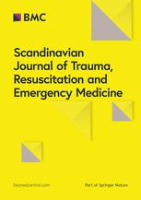
Scandinavian Journal of Trauma Resuscitation & Emergency Medicine
Elevating Emergency Medicine with Cutting-Edge InsightsThe Scandinavian Journal of Trauma Resuscitation & Emergency Medicine, published by BMC, stands as a leading open-access platform dedicated to advancing the fields of trauma, resuscitation, and emergency medicine since its inception in 2008. With an ISSN of 1757-7241 and an impressive track record, this journal has established itself in the top quartile of critical care and emergency medicine, achieving Q1 rankings in both categories for 2023. Its Scopus rankings further underscore its importance, placing it among the top 11 journals in emergency medicine and the 23rd in critical care and intensive care medicine, signaling a strong impact within the academic community. As we converge toward 2024, the journal continues to provide researchers, clinicians, and students with valuable access to cutting-edge research and developments in the sector, contributing significantly to knowledge, practice, and policy in emergency care. Located in the heart of the United Kingdom, the journal remains dedicated to its mission of fostering innovation and dissemination of high-quality research, ensuring that vital medical advancements reach those who need them most.
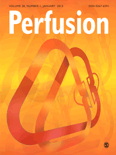
PERFUSION-UK
Bridging Theory and Application in Perfusion SciencePERFUSION-UK is a distinguished academic journal published by SAGE Publications Ltd, focusing on advanced topics in the fields of nursing, cardiology, and radiology, among others. With an ISSN of 0267-6591 and an E-ISSN of 1477-111X, this journal serves as a crucial platform for disseminating vital research and innovative practices in both theoretical and applied aspects of perfusion science. Operating from the United Kingdom, it has an impressive history, converging years from 1986 to 2024. In the 2023 category quartiles, it has secured a Q2 ranking in Advanced and Specialized Nursing, revealing its strong reputation in the nursing community, while also ranking Q3 in cardiology and other medical specialties, which highlights its multidisciplinary significance. With a commendable Scopus ranking positioning it favorably among its peers, PERFUSION-UK is committed to providing researchers, professionals, and students access to cutting-edge studies and practices, ultimately aiming to enhance patient care and safety in clinical settings.
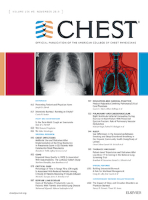
CHEST
Exploring the frontiers of cardiology and pulmonary medicine.CHEST is a premier journal published by Elsevier, focusing on the vital fields of cardiology, critical care, and pulmonary medicine. Established in 1970, this esteemed journal has continually provided authoritative research, reviews, and clinical studies, catering to a global audience of healthcare professionals, researchers, and students. With an impressive impact factor, CHEST ranks in the top quartile (Q1) across its core categories according to the latest Scopus metrics, securing its position as a leading resource within cardiology (Rank #16), pulmonary (Rank #9), and critical care (Rank #8). Published quarterly, it offers a wealth of knowledge essential for advancing understanding and improving patient outcomes in these critical areas of healthcare. Researchers and practitioners are encouraged to submit their work, contributing to the ongoing discourse that shapes innovative practices and policies in respiratory and cardiovascular health.
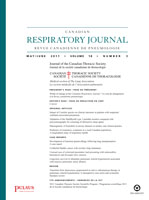
Canadian Respiratory Journal
Elevating the discourse in respiratory health globally.The Canadian Respiratory Journal is a prominent peer-reviewed publication dedicated to advancing knowledge in the field of pulmonary and respiratory medicine. Published by HINDAWI LTD and based in Egypt, this journal has been an Open Access platform since 1994, ensuring broad dissemination of vital research findings to a global audience. With an ISSN of 1198-2241 and an E-ISSN of 1916-7245, the journal plays a significant role in shaping respiratory health discussions, evidenced by its 2023 category rankings of Q2 in Medicine (miscellaneous) and Q3 in Pulmonary and Respiratory Medicine. The journal consistently publishes high-quality research, reviews, and clinical guidelines that resonate with practitioners, researchers, and students alike. It serves as an essential resource for those seeking to stay at the forefront of developments in respiratory health, reflecting its commitment to enhancing practice and informing policy while recognizing its place in this vital medical field.

Zeitschrift fur Herz Thorax und Gefasschirurgie
Exploring the Frontiers of Cardiac and Thoracic MedicineZeitschrift für Herz Thorax und Gefäßchirurgie, published by Springer Heidelberg, serves as a prominent platform for disseminating vital research in the fields of cardiology, cardiovascular medicine, pulmonary and respiratory medicine, and surgery. With its ISSN 0930-9225 and E-ISSN 1435-1277, this journal not only captures significant clinical advancements but also engages with emerging trends, promoting collaboration among researchers and healthcare professionals in Germany and beyond. Although categorized in Q4 quartile across its listed specialties and holding relatively low Scopus ranks, its enduring commitment to advancing surgical methodologies and cardiovascular treatments for over two decades (from 1997 to 2024) underscores its role in the academic community. This journal is essential for those looking to stay informed about contemporary studies and innovations in heart, thoracic, and vascular surgeries.